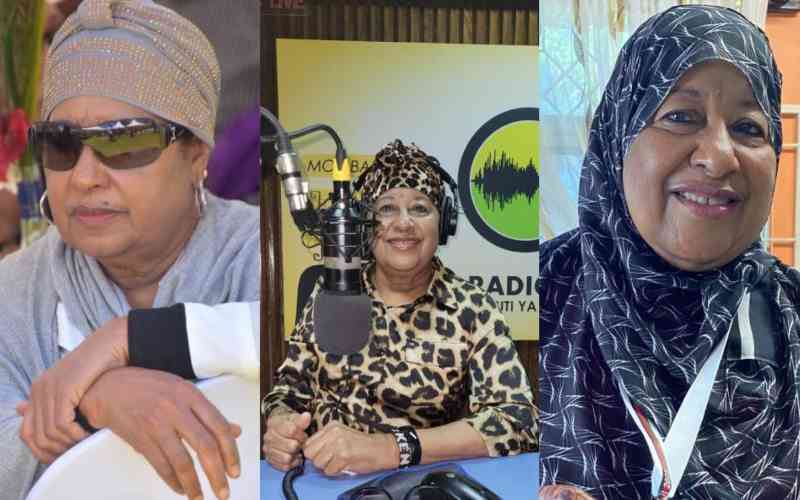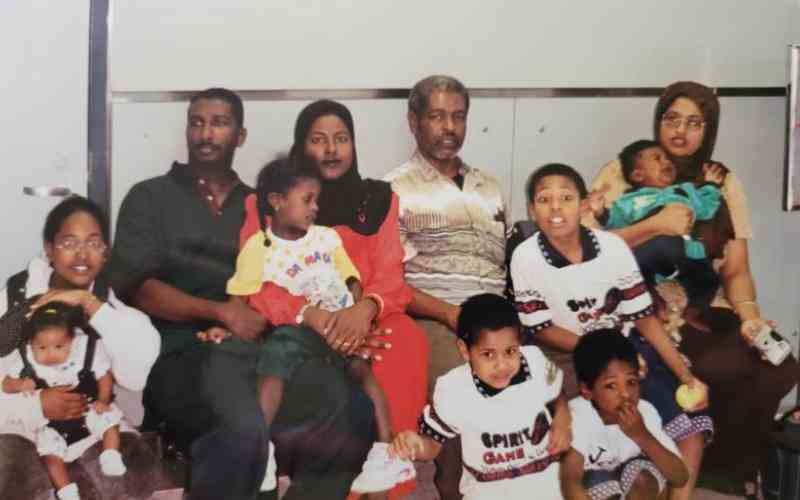
Khadija Ali needs no introduction. The radio and television personality is one of Kenya’s pioneer celebrities before being a celebrity was a thing locally.
Her style of doing things endeared her to millions of listeners and viewers across the country.
When she was behind the microphone on official assignments, she did it with zeal, passion and precision.
She worked as a radio and television presenter for years before she was promoted to production in the national broadcaster – Kenya Broadcasting Corporation.
Her eloquence and clarity in her voice in news reading were music to her listeners and viewers.
Kiswahili was her language of choice. And that’s how Khadija rose to prominence in the race for top honours among the first few pre-independence pioneer female newscasters in Kenya.
“I always liked my work and I have been passionate about it for the years I worked there,” says Khadija who worked for KBC before and after it was converted into a parastatal by an Act of Parliament in 1989.
In the course of her work, Khadija has been to the US and Europe on official assignments several times.
In her globetrotting missions, she has been trained by various international media organisations.
While in Germany, she received training from Radio Deutsche Welle in Bonn, exposing her to some of the most well-respected and equipped international media studios in the world.
“Visiting these countries, made me improve my social networks and new sources across the globe. I have made friends across the Atlantic world,” she says. The broadcaster was also an entertainer. She likes different types of music but loves Taarab, which saw her get allocated time for Taarab special programmes.
“I liked Taarab music, but that did not mean I did not give airtime to other forms of music,” says Khadija.
How did she land a job at KBC?
“Initially, I was an actor in radio programmes for many years. Our auditions impressed many, attracting great audiences that influenced them to be aired regularly on KBC Radio weekly.”
“My voice attracted the attention of the then KBC Director Jared Kangwana, who sought to know who I was. After consultations, he said I be employed, and that is how I landed my job at the Voice of Kenya (VOK) now KBC,” she says.
That happened in 1974 at a time when the VOK was the only radio and television station in Kenya, before the emergence of private radio and television stations in the early 1990s.
“At the station, my first assignment was as a news reader in the Idhaa Ya Taifa Radio. Later, I landed several news reading assignments in television before graduating as a presenter and later a producer,” she says.
Besides news reading, Khadija was a continuity announcer, who broadcasted news items with flourish. Her budding Taarab music show was aired thrice a week.
She has also been a dedicated mentor to newscasters, generously sharing the invaluable tricks of successful broadcasting.
Her peers, who are also mentors, include Amina Fakih, Ali Salim Manga, Elizabeth Obege, Elizabeth Omollo and Leonard Mambo Mbotela.
“Our work was driven by a passion that was well inculcated and cultured in us when we entered the organisation. It was led by some deep understanding in us as employees that led to the production of talented announcers, presenters and commentators, who later gave birth to the current crop of journalists,” she says.
Khadija says that synergy was essential in all their daily broadcasting business.
“No one would miss work unless under extreme difficulties. And that is how we worked as a family unit that nurtured overflowing talents, which have since spiralled to the many stations today,” she says.
The presenter, who has since retired, received several Presidential Awards from retired President Uhuru Kenyatta.
They include the 2023 Lifetime Achievement Award from the Media Council of Kenya, the Annual Journalism Excellence Award and the KBC Living Legend of Broadcasting in Kenya.
“I loved my work. This is what has made me to be what I am today. Sheer hard work has earned me accolades in Kenya and internationally,” she says.
Khadija is a respected Kiswahili presenter in the Kiswahili-speaking countries of Kenya, Uganda, Tanzania, Rwanda, Burundi and the Democratic Republic of Congo and Malawi.
“Khadija was good in her work; we respected her for what she did. Her work is well articulated, her voice classic,” says Jemimah Otieno who works with a government parastatal in Mombasa.
Jemimah, together with Aisha Mohammed were ardent radio and television fans of Khadija.
“She was good at her work, and that is why she was appealing to most Kenyans,” says Aisha.
Comparing the journalists of today and those of yesteryear, Khadija says, “The latest crop of journalists are money-minded and their work is pegged on what they take home. It needs to be corrected.”
“We must ensure we change this tradition. We need to redeem ourselves to steer the profession back to its lost glory. We need to protect the integrity of this profession by instilling discipline in upcoming journalists,” she says.
The veteran journalist is married to retired Electrical Engineer Ali Mohammed. They have five children and several grandchildren. She talks about work-life balance. “Time for my husband and family was a must. There were no two ways about it.”

She enjoys watching movies and travelling.
“I like visiting different countries around the globe. That is what makes my life complete.”